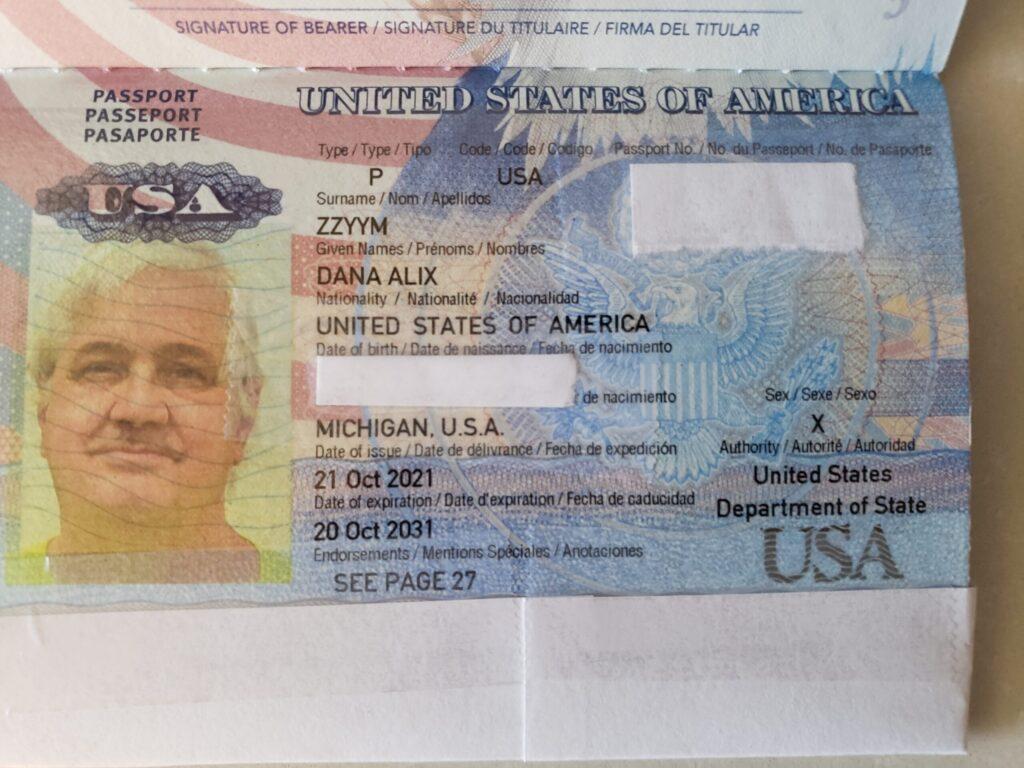
It was a message Dana Zzyym spent nearly a decade waiting for.
The text on their phone Wednesday morning notified them that a delivery from the U.S. Department of State had arrived at their apartment in Fort Collins. Zzyym had spent the previous night at a hotel after celebrating Intersex Awareness Day with friends.
Zzyym, 63, identifies as intersex and nonbinary — two umbrella terms for individuals who aren’t born with traditional male or female reproductive anatomy or choose not to identify with either term.
After seeing the text, Zzyym drove home, picked up the envelope and took it back to their hotel. In front of several friends, they ripped it open. From inside, Zzyym pulled out a new passport and flipped to the front page.
Under the marker for gender was a large capital “X.”
“We whooped and hollered a bit,” Zzyym said. “It felt so good because this is who I am. This is my truth.”
The moment completed a nearly decade-long pursuit from Zzyym to obtain a passport showing their preferred gender marker. The State Department on Wednesday confirmed it had issued the country’s first passport with an “X” gender marker.
“The Department of State continues the process of updating its policies … to better serve all U.S. citizens, regardless of their gender identity,” said Ned Price, a department spokesman, in a release. “We look forward to offering this option to all routine passport applicants once we complete the required system and form updates in early 2022.”
Zzyym’s quest to get their preferred gender marker on their passport began in 2012 amid planning for a trip to Mexico City. When applying for a new passport, the activist attempted to write “intersex” in the gender marker field.
The State Department denied their application because at the time the federal government only recognized two options for gender — male or female.
Two years later, Zzyym filed a lawsuit in the U.S. District Court of Colorado, asserting that the decision violated federal law. In 2016, the court ruled in favor of Zzyym.
Under the Trump Administration, the State Department refused to change its policy and appealed the decision to a higher court. Last year, the higher court again ruled in favor of Zzyym and ordered the federal government to honor Zzyym’s request.
“This is a momentous day and its significance cannot be understated,” said Paul Castillo, Zzyym’s attorney, in a statement Wednesday. “After a six-year legal battle with three favorable court rulings, Dana has finally received an accurate U.S. passport. They showed incredible courage and perseverance throughout the case.”
Zzyym’s legal victory comes as the federal government and many states, including Colorado, look to change their rules around gender markers on vital documents.

In 2018, Colorado started offering “X” as a gender marker option on state driver’s licenses and other state IDs.
Last year, a new state law went into effect that removed decades-old requirements of surgery, a doctor’s note, a court order and newspaper publication to make gender changes to vital documents such as birth certificates. Now Coloradans over the age of 18 can make the switch by filling out a self-attestation form.
The state also recently became the first in the nation to require some health insurance companies to cover gender-affirming care, such as hormone therapy and facial reconstruction surgery. The move has already drawn some pushback from conservative lawmakers.
Zzyym said there are more federal government documents, including some to get Social Security benefits, that they would like to see offer an “X” option for intersex individuals.
“I hope that happens,” Zzyym said. “I consider my case a ripple effect that went around the country and basically forced the federal government to start thinking about making a change here.”
For now, Zzyym will remain the only person in the U.S. to have a passport with “X” gender marker. The option won’t open up to the general public until early 2022.









